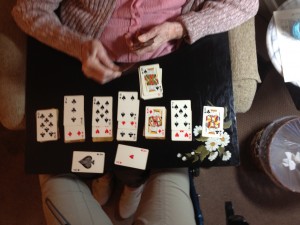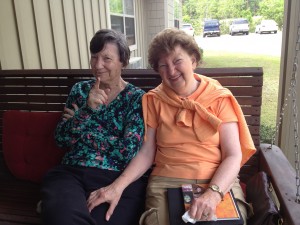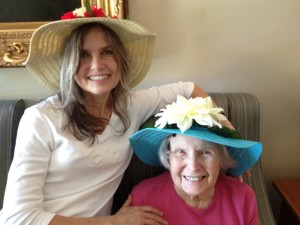When Caregiving and Cell Phone Technology Come Together
My family did a cell phone intervention with me two years ago. I had held on to my original cell phone plan for many years and resisted any changes. So when they transferred my number to a smart phone and a new company, I knew I was beat. I tried to keep an open mind. According to my family, now I would be able to text with them and do all the other things they could do—whatever that was.
My family was right. Once I mastered texting and using the phone, I began to explore apps. First I followed recommended apps from my husband and son but then began to branch out and find what interested me. Since I am a caregiver for my mom who has Alzheimer’s disease, I soon found that my cell phone was my constant companion and record keeper. For example, I store information I need for doctor visits under Notes, as well as document what we discussed at the appointment. I set up Reminders for myself such as pay the private duty sitter and other bills or get medication and supplies. I have a Pill Finder app that helps me identify pills I find on the floor that Momma didn’t take and threw away. I can look up medications and their side effects if she is having some unexplainable symptoms. When we do her laundry, I can set the Timer to alert us to when the washer and dryer cycle is finished.
My phone has replaced the camera I once carried around. Just like everyone else with a smart phone, I am constantly taking photos of all the people in my family’s life. Once Momma moved to assisted living, we used photographs to help us remember faces and names of all the people that helped care for her. We set up a poster-sized frame in her room with pictures of all the employees, their job titles, and names. To boost visibility, it hung on the wall just inside her door, which encouraged many impromptu visits and comments. I was surprised to find how willing doctors are to have their photo taken with their patients. These photos would come in handy when we were about to have an appointment with the doctor and I could show Momma who we were going in to see. The pictures serve as our memory, and we can look at them over and over again.
The phone is also a resource for activities. We enjoy listening to Pandora’s easy listening music while accomplishing activities like brushing her teeth, painting her nails, or playing cards. I attach speakers to the phone to provide vintage music while leading a group exercise class for the other residents, and I can take requests without any prior preparation. Sometimes I look up words to old songs we can sing together because we’ve forgotten some of the words. Poems and even nursery rhymes are just a touch away with Internet service as part of the phone plan.
One app allows me to scan important documents and even send them by email with FasterScan, which expedites duties like filling out paperwork for moving into skilled care. I no longer have to be home to receive phone calls, send emails, or handle bank business. I can manage these responsibilities and still be with my mom. I finally have learned to complete as much information as I have on a phone contact to save time for future communication. I can text messages with Momma’s private sitters and receive an immediate response when needed. For my peace of mind, they have sent me photos of Momma while she is in their care just to let me know what they are doing. When I’m with her, I can send a text and photo to one of my children and share a response on the spot.
Even though cell phones are relatively new, Momma has embraced the little rectangular box we carry around that emits music and provides amusement in so many ways. I usually hand it to her to hold when I am pushing her in the wheelchair when we have the music playing. Because of her failing eyesight, the bigger screen of a computer or iPad is a better choice if I want her to see specific pictures clearly. However, for daily use and ease of transporting, my cell phone is all we need.





Recent Comments